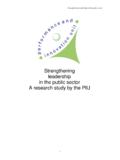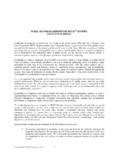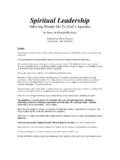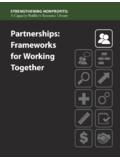Transcription of THE TOP 10 WAYS TO STRENGTHEN YOUR SELF …
1 THE TOP 10 WAYS TO STRENGTHEN your self - leadership . Dr. Rick Bommelje self - leadership is the first level of leadership and applies to any person, whether or not they hold a management or supervisory position. self leadership is the ability of someone to guide themselves to positive places that they have never been before. It enables a person to fulfill their potential while building a strong foundation from which to make daily decisions -- both professionally and personally. Without a strong sense of self - leadership , people can feel out of control, overwhelmed and un- focused. 1. CLARIFY your PURPOSE. Purpose is at the base of your personal foundation and defines your reason for living. Without a well-defined purpose, you are at the mercy of others who will try to define your purpose for you. So the self - leadership journey begins by asking the vital question: Why do you exist?
2 This can be a rather intimidating question but it must be asked and answered if you are to begin the process of leading yourself. It is your choice -- you can play the role of the victim and take a chance and play the odds by being a part of someone else's purpose or your can be the victor and develop your own purpose and plan. Is the purpose of your life to simply breathe in oxygen or is there more meaning to it? self -LEADERS HAVE A PURPOSE. 2. USE your GIFTS -- AND USE THEM WITH DISCIPLINE. We all have God-given gifts, talents, and abilities for our use. The big question is: "Are you using your gifts?" The bestselling author H. Jackson Brown remarked, "Talent without discipline is like an octopus on roller skates. There's plenty of movement but you never know if it's going to be forward, backward or sideways." The only way that a person can realize their fullest self - leadership potential is to use their gifts every day.
3 This takes a disciplined approach. Do you know what your gift(s) are? Are you using your gifts every day? your gifts are meant to be shared with others. Without discipline, the gifts that you have will not reach their maximum potential. Have you ever noticed that those people who have passion seem to be using their gifts to the fullest levels? The primary reason is that they have taken the word PASSION and fully recognizing that it means PASS-I-ON (passing some of I on to others). self leaders develop their gifts with discipline 3. REFLECT & FORWARD your LIFE. self -leaders understand the power of reflection and what it means to their growth potential. To reflect means to step back and learn from what life is revealing to you. This could come in the form of information that you already know or, more importantly, it is information and feedback that comes from other sources.
4 Rather than be quick to defend your position, consider using the gift of feedback to your advantage. For example, 360 feedback assessments are becoming very popular as a way of presenting feedback from a variety of sources (peers, bosses, employees, customers, vendors, etc.) The most important part of the 360 feedback process is what you do with the information. Are you inclined to open yourself to things that will reveal your opportunities for development or do you become defensive? self -leaders accept feedback as a gift. After going through the 360 feedback process, one General Manager in a mid-sized corporation commented, "The report revealed my people said I am not communicating my vision to them." Initially, the manager shook her head in disbelief, re- counting several meetings in which she explicitly shared her views about her vision with her employees.
5 But after reflecting on the statements, she recognized that her communication style was not connecting with her employees. Without this candid feedback, she would have never known that there was a disconnect. Reflecting highlights learning opportunities from which you can grow significantly. self -Leaders reflect and forward their life. 4. SERVE OTHERS. self leaders understand the power that is generated from serving others. This links back to numbers 1 and 2 (purpose and gifts). The concept of servant leadership is thousands of years old. Yet, the essence of it lies in the question, "Do those whom you serve grow as persons?" This can apply to those we serve on the job as well as our family members, friends, neighbors, etc. self - Leaders are servant leaders. 5. PULL UP THE STAKE. When an elephant is born, shortly after birth, they are chained to a stake to keep them from wandering away.
6 It is estimated that during the first 3 years of their life, they pull on the stake approximately 10,000 times. Even when they grow to full maturity, they rely on their wonderful memory from childhood that keeps them from pulling up the stake. They give in to the desire to pull up the stake because they convince themselves that it is useless. Many of us have elephant sized habits in our own life that keep us from reaching our true potential. We have given up trying. Unlike elephants, self -leaders are continually "pulling up the stake." They know what their elephant sized habits are -- and come up with strategies to break away. self - leaders pull up the stake. 6. MAKE THE PRESENT PERFECT. One study estimated that people live either in the past or in the future between 50-95% of the time. There are two conditions of time: now and not now.
7 self -leaders recognize that the past is gone and they have no control over the future. Living in the now --or present-- is both healthy and more productive. It is a waste of our energy and time to stay in the past or the future much more than 20% of our total waking hours. If you live minute by minute, hour to hour, there will be much less chance of dwelling into the past or dreaming too far into the future. self -leaders make the present perfect. 7. LISTEN, LISTEN, LISTEN. Listening is the one activity you do more in life than any other activity except to breathe. How much time and energy do you exert in developing the communication skill that has been with you since birth? self -leaders capitalize on the power of listening. They listen for what people say, what they don't say, and what they would like to say but don't know how to put into words.
8 When is the last time that you were either involved in or observed a situation in which there was a cost due to a listening breakdown? Most people can identify several recent examples in their own life. The costs can be staggering. self -LEADERS LISTEN, LISTEN, LISTEN. 8. BE 100% HONEST--WHEN SPEAKING WITH OTHERS. Holding back how we "really" feel when communicating with others does more damage to ourselves, as well as to the relationships we have with others. It takes courage and practice to "level" with others in a non-aggressive and non-judgmental manner. self -Leaders have developed the ability to give unconditionally and constructive feedback. This is an integrity- based style of living. self LEADERS ARE 100% OF THE TIME - WITH OTHERS AND. WITH THEMSELVES. 9. STOP TOLERATING. What are you tolerating? A toleration is something or someone that keeps you from having the quality of life that you deserve.
9 Make a list of all the things that you are you are putting up with currently and make decision to do one of 3 things: 1. eliminate it; 2. reframe how you view it; or 3. respond to it. One survey noted that people most tolerate their car; their home; their quality of life; stress at work; their own bodies; money concerns; the behaviors of others; delays and waiting in lines; shopping and sales clerks; and problems. Once you have identified your tolerations, begin to work on them! Until you handle your tolerations, no significant changes can happen. self -leaders stop tolerating! 10. TAKE CALCULATED RISKS & FOCUS ON SUCCESS. self - Leaders are risk takers. The word failure is not part of their vocabulary. They focus on succeeding rather than on not failing. For example, speaking in public is rated as the number one fear of adults in America.
10 Those people who have this fear are typically more concerned about embarrassing themselves in front of others than in sharing meaningful information with their audience. Most of their energy is invested in not failing. Unfortunately, in their attempt not to fail, they miss the true spirit of learning-- which is built on taking a risk. self LEADERS. REGULARLY TAKE CALCULATED RISKS AND FOCUS ON SUCCESS. By spending time and energy on these 10 actions you will quickly STRENGTHEN your self - leadership skills and be on the path to realizing your fullest potential. 2009, Dr. Rick Bommelj







